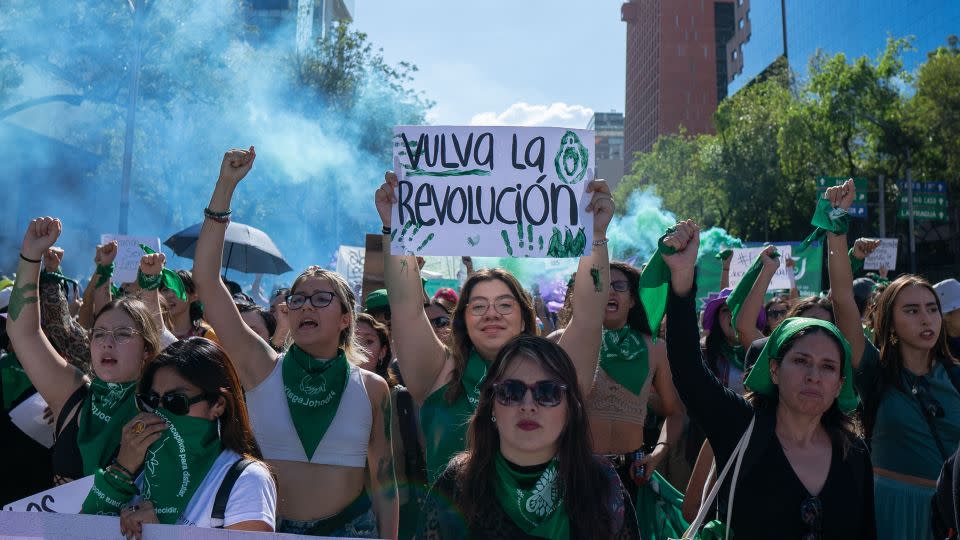Opinion: Mexico’s historic moment makes me wonder if I’ll live to see a US woman president
Editor’s Note: Alice Driver is a writer who divides her time between Mexico and the US. She is the author of “Life and Death of the American Worker: The Immigrants Taking on America’s Largest Meatpacking Company.” Her work has appeared in The New Yorker, The New York Review of Books, and Oxford American. The opinions expressed in this commentary are her own. Read more opinion articles on CNN.
In Mexico, the frontrunners in the 2024 presidential election were both women, and women make up at least 50% of Congress, half the Cabinet, and lead the Supreme Court. After the nation went to the polls on June 2, Claudia Sheinbaum is projected to be Mexico’s first woman president, a stark contrast to the United States, which has never elected a woman to the highest office and has seen its Supreme Court overturn a ruling that established a national right for women to choose abortion.

Sheinbaum and presidential runner-up Xóchitl Gálvez have voiced their support for reproductive rights, even if neither has shared specific proposals on abortion. Gálvez, a former senator who is of indigenous Otomi ancestry, has said, “I don’t agree with criminalizing any woman who has an abortion, I am totally against it.” Sheinbaum, a scientist and the former Mexico City mayor, has promised to guarantee “access to health for women throughout their life cycle, especially with regard to sexual and reproductive health.”
Sheinbaum’s win is a historic moment for Mexico. If former President Donald Trump wins the US election in November and oversees a further restriction of access to women’s health services, women may need to cross the border to Mexico to access such fundamental reproductive rights as buying birth control.
This is not to say that Mexico’s next president and runner-up are perfect because women are as complex and fallible as anyone else. For example, Sheinbaum is a staunch supporter of outgoing Mexican President Andrés Manuel López Obrador, who has called women’s rights activists “pseudo-feminists.” Nearly 100 million Mexicans were registered to cast their ballots on June 2 (with participation between 58.9% and 61.7%), and in Mexico, many debate whether Sheinbaum, who won some 60% of votes, will be a feminist leader or even a great president.
I would argue that in a country where at least 10 women and girls are murdered per day, electing a woman to lead the country is beyond symbolic. Mexican citizens will spend the next six years watching a woman lead the country. While a woman may not govern with a feminist perspective, as Americas Society/Council of the Americas President and CEO Susan Segal noted, “This is great news, as studies show that women are more likely to build consensus and advocate for a socially inclusive agenda.”
In a stark contrast, voters in Mexico’s northern neighbor face an uninspiring choice between two men, one who has worked to undermine reproductive rights and the other who has done little to defend them. Although the US has long claimed to be at the forefront of gender equality, in some respects, Mexico is leaving Americans in the dust.
Trump has been on trial in New York over charges that he helped falsify business records to conceal an alleged 2006 sexual encounter with adult film star Stormy Daniels. (Trump denies both the affair and the criminal charges.) When not in court, he has been on the campaign trail telling voters he is proud that the Supreme Court justices he nominated overturned Roe v. Wade.
In recent weeks, Trump, the frontrunner according to polls, has said he’s “looking at” allowing bans on birth control. Facing a backlash, he immediately walked back his statement, declaring that he would “never advocate” for contraception restrictions and claimed he never had. (Trump’s campaign said it would have a policy on the matter soon. His campaign said he has consistently supported states making policy on abortion within their own borders.)
As president, Biden has spoken about “reproductive freedom” but done little to defend it. While he has stated support for Roe v Wade, in 2023, at a fundraiser Biden said, “I’m a practicing Catholic. I’m not big on abortion.” According to recent polls, 63% of Americans say that abortion should be legal in all or most cases.
In post-Roe America, pregnant people often experience delayed and denied care that puts their lives at risk. In response, pregnant people in the US have increasingly been traveling to Mexico for abortions since the procedure has been decriminalized in several states.

For decades, abortion was criminalized in Mexico, while in the US the constitutional right was established in the Roe v. Wade decision in 1973. In 2023, Mexico’s Supreme Court removed abortion from the federal penal code, a move that gave officials the authority to allow the procedure on a state-by-state basis. In Mexico, 12 of 32 states have decriminalized the procedure. In the US, by contrast, states have been passing laws that move things in the opposite direction. Since the Supreme Court overturned Roe v. Wade, more than 20 US states ban or restrict abortion. In Arkansas, my home state, abortion is illegal with no exceptions for rape or incest.
As feminist movements have swept Latin America, abortion access in the region has increased. While Mexican feminists celebrated their Supreme Court’s decision, many conservatives in the Catholic-majority country were upset by the ruling. In recent years, three of the four most populous countries in Latin America – Mexico, Argentina and Colombia – have decriminalized abortion.
Since Roe v. Wade was overturned, Mexican activists, in solidarity with American women, have worked to provide resources like pills and to shuttle women from the US to Mexico to seek abortions. Verónica Cruz is the founder of Las Libres, a Mexican NGO that defends and promotes women’s rights and supports “women in the United States who lost their right to choose when Roe v. Wade was reversed.” Cruz said, “It surprised me that Mexico is going forward, and the United States is going backward. I never imagined that.”
In the US, I wonder if I will see a woman elected as president in my lifetime. But more pressingly, I have observed how, during the Trump and Biden administrations, reproductive rights have been eroded. Abortion bans make pregnancy more dangerous, as articles like “Did an Abortion Ban Cost a Young Texas Woman Her Life?” show us. But I don’t need to read an article to know how the girls, women, and pregnant people in my life are affected – I witness the painful decision they must make, ones that often put their lives at unnecessary risk.
My mom, 75, who had an abortion in her 20s, recently asked me to get a tattoo with her – a coat hanger. For her, it symbolizes the danger inherent in not allowing pregnant people a full range of reproductive choices. She is thankful that, at least, times have changed, and women in the US who live in the more than 20 states that ban or restrict the procedure can receive abortion pills via mail from Mexico.
This article has been updated with election results.
For more CNN news and newsletters create an account at CNN.com

 Yahoo News
Yahoo News 
